The war in Ukraine has unleashed a cascade of negative consequences in Europe’s energy sector. Sanctions on gas, coal, and oil are potentially the most painful for Russia, but for the EU as well.
Part of the answer to this energy crisis is coal, the dirty fossil fuel that Europe is trying to phase out, according to a Warsaw School of Economics (SGH) report released during the Karpacz Economic Forum, an annual event some refer to as Central and Eastern Europe’s answer to Davos. The forum, which has been held every year for 31 years, serves as a venue for the exchange of ideas and opinions of key policymakers and experts from the region and beyond.
The SGH report focuses on energy issues and argues for maintaining the use of coal power for longer than had been envisaged by European leaders. The authors praise Poland for having made the right call on geostrategic risks with its diversification of gas imports, a move that allowed the country to maintain more independence from Russian energy sources. That policy is likely to increase Poland’s influence in the region and help ensure energy security. The country’s infrastructure also allows it to assist Germany in meeting the country’s refinery needs after the embargo on Russian oil kicks in.
The report concludes that it will be necessary to maintain coal power for longer than had been anticipated. This will create difficulties given the costs of emission certificates and other regulations covering installation costs. This, in turn, could lead to the need for the design of new assistance mechanisms to help the sector cope.
The SGH report calls for more state intervention aimed at making maximum use of existing gas infrastructure via better demand management; it also encourages greater use and development of renewables. Technological innovation in the storage and management of energy will be crucial to ensure Poland meets these goals.






